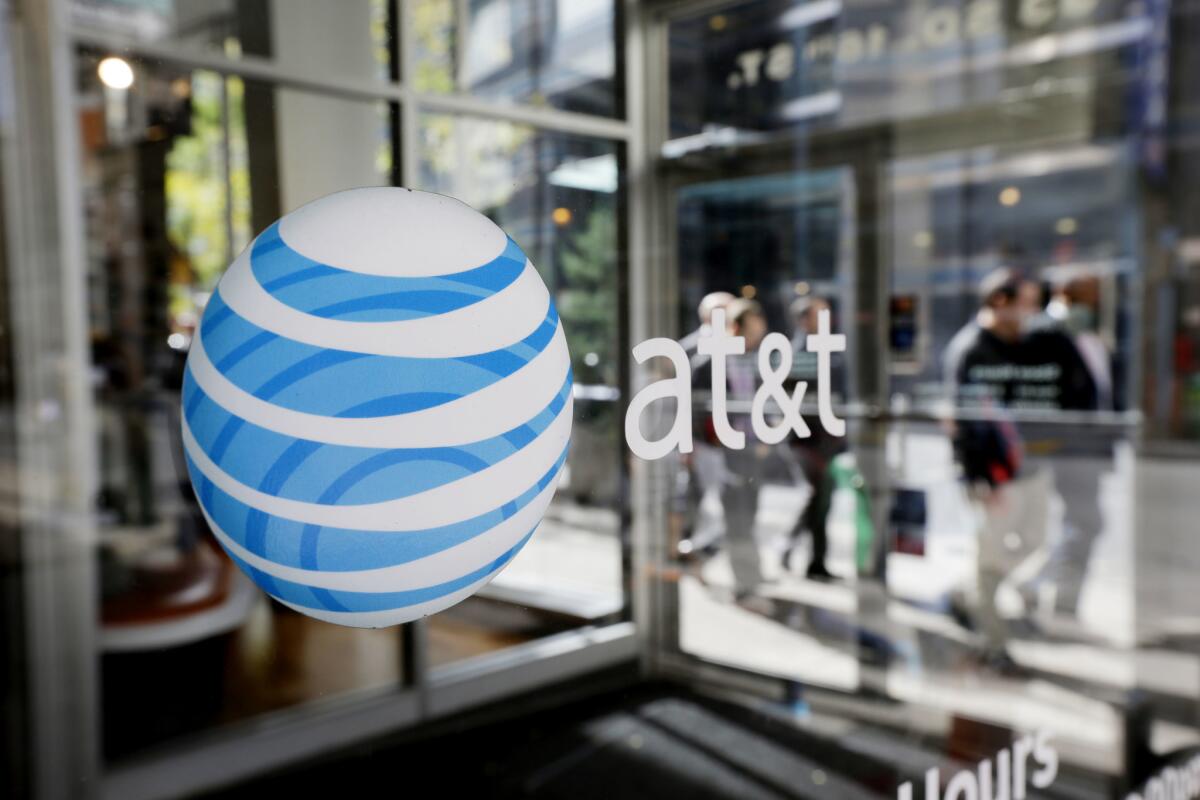AT&T lifts some data caps after regulator’s coronavirus plea

- Share via
AT&T Inc. will lift data caps on some of its broadband plans, responding to a federal regulator who was concerned that homebound consumers could be penalized for heavy internet use during the coronavirus crisis.
“It’s not fair for people to be told to go home, and work online or learn online, and find they have to pay a premium,” said Commissioner Jessica Rosenworcel, a member of the Federal Communications Commission’s Democratic minority.
Major internet providers, including AT&T, Verizon Communications Inc. and Comcast Corp., typically charge more for heavy internet use. AT&T’s move is aimed at subscribers with metered plans who pay on the basis of how much data they use. Verizon didn’t say if it would lift data caps during the crisis.
“Many of our AT&T internet customers already have unlimited home internet access, and we are waiving internet data overage for the remaining customers,” the carrier said. “Additionally, through Access From AT&T we’ll continue to offer internet data to qualifying limited-income households for $10 a month.”
Schools, sports leagues, law firms, the federal government and other organizations have all closed or encouraged employees to work from home as the U.S., like other nations, fights a pandemic caused by the novel coronavirus. On Wednesday, the leading U.S. infectious-disease official said the testing system in the country is failing, and President Trump’s travel restrictions drew criticism from Europe.
U.S. carriers sell internet service with data allotments. Those plans come with added fees if customers exceed limits. Unlimited plans typically slow down when use exceeds certain allotments, but don’t impose a penalty.
To help students as schools close and classes move online, the FCC also should use its subsidy programs to supply schools with Wi-Fi hot spots so homebound pupils can connect to lessons and teachers, Rosenworcel said in an interview.
“We’re about to have a reckoning. We should do something,” Rosenworcel said. “We are going to rely on our networks like never before. We should apply policies that keep everybody connected.”
Rosenworcel’s proposal represents a challenge to FCC Chairman Ajit Pai, because the Republican controls the agency’s agenda.
An FCC representative said in an emailed message that the agency “has already been coordinating closely with network operators.”
Regulators are “encouraged by the feedback we have received both regarding the ability of their networks to handle changes in usage patterns caused by the coronavirus outbreak and their plans to maintain their own operations during the outbreak,” the official said.
A spokeswoman for CTIA, a trade group for carriers, didn’t immediately respond to a request for comment.
Verizon hasn’t yet seen any decline in network performance as more customers log in to work from their homes, a company spokesman said. The company said Thursday it will increase its capital spending by about $500 million this year to expand network capacity and upgrade to 5G technology.
Verizon is the largest U.S. mobile provider. About half of its wireless customers are on plans with data limits, Matthew Ellis, chief financial officer, told investors in January. Verizon is trying to move customers to pricier unlimited plans as they need more data, Ellis said.
Verizon’s base unlimited plan starts at $70 a month and service is automatically slowed at times of network congestion. The company’s highest-priced unlimited plan is $90 a month and imposes speed limits after customers reach a 75-gigabyte allotment.
AT&T starts its unlimited plan at $65 a month and also slows the speed during times of heavy traffic. AT&T’s top tier plan starts at $85 a month and will throttle speeds after subscribers exceed 100 gigabytes of date within a month. For reference, Netflix Inc. says an hour of streaming uses about 1 gigabyte of data.
About 42 million of 144 million U.S. workers could do their jobs at home in 2018, or just 29% of the workforce, according to the U.S. Bureau of Labor Statistics.
“We have to bring our nation’s broadband providers together and say we are going to have a collective problem,” Rosenworcel said. “It’s not just going to affect our households and communities, it’s going to affect our economy.”
Comcast, the largest U.S. cable operator, didn’t comment on data caps. It said it would offer 60 days of free internet service to new users of its program for low-income households, which usually costs $9.95 a month.
More to Read
Inside the business of entertainment
The Wide Shot brings you news, analysis and insights on everything from streaming wars to production — and what it all means for the future.
You may occasionally receive promotional content from the Los Angeles Times.










